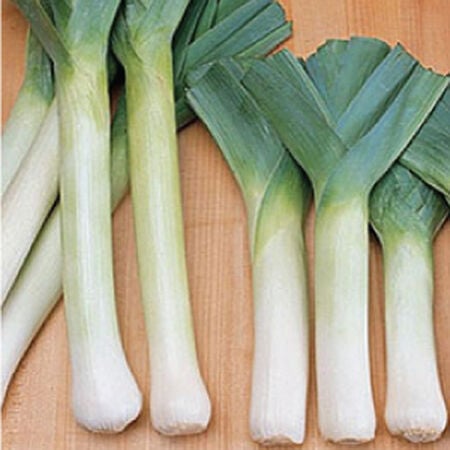King Richard, Leeks
Key Attributes
Key Attributes
Product Details
Weight
0.01Depth
0.1Height
4.5Width
3.25Plant Height
12-18"Botanical Name
Allium porrumSeed Type
SeedAdditional Characteristics
Container VegetablesSeeds Per Gram
335Seeds Per Pound
152,000Row Spacing
18"Packet
500 SeedsSow Depth
1/4"Seeds Per Ounce
9,500Breed
Open-pollinatedSun
Full SunGrowing Conditions
Container FriendlyFruit
Medium GreenCubic Inches
1.4625Life Cycle
AnnualSow Method
TransplantPlant Spacing
6"Categories
LeekGermination
11,12,13,14,10Days To Maturity (# Days)
75Seeds Per Acre
11 oz.Components
Growing Instructions
![]() Learning Download: How to Grow Leeks
Learning Download: How to Grow Leeks
Similar to an onion but with a sweeter flavor, leeks make a great addition to salads and soups. The vegetable is hardy and can often be grown in cooler climates.
Before Planting: Leeks are heavy feeders and require fertile soil (pH of 6.2-6.8) for best results.
Planting: Sow 3 months before last frost date, 2-3 seeds per cell, 1/4″ deep. Beginning in late spring, when approx. 8″ tall and pencil-thick, transplant outdoors 6″ apart, rows 24″ apart in holes dibbled about 6″ deep. Only 1-2″ of leaves need extend above the soil surface. Do not firm soil, allow irrigation or rain to fill in the dibble hole.
Watering: Since leeks have shallow roots, they require lots of water and a weed-free environment. Add mulch to retain moisture and deter weeds.
Fertilizer: A season prior to planting, add compost where the leeks will grow. After planting, feed the leeks every week with liquid fertilizer.
Days to Maturity: Leeks are ready to harvest in the late summer or early fall, and the whole plant should be harvested. (See each variety for days to maturity)
Harvesting: To harvest, loosen the soil and then lift the leeks out be the roots so you don’t damage the plant. Pick what you need until a freeze is suspected to hit, then harvest all the leeks.
Tips: During the growing period hill the plants with soil 2 or 3 times, higher with each hoeing. This forces the leaves higher up the plant resulting in extra long blanched stalks and a much greater edible portion.
AVG. Direct Seed Rate: 1,000 seeds/165′, 1 oz./1,650′, 11 oz. or 105M/acre at 6 seeds/ft. in rows 30″ apart.
Shipping Schedule
Our Seed Promise
 "Agriculture and seeds" provide the basis upon which our lives depend. We must protect this foundation as a safe and genetically stable source for future generations. For the benefit of all farmers, gardeners and consumers who want an alternative, we pledge that we do not knowingly buy or sell genetically engineered seeds or plants.
"Agriculture and seeds" provide the basis upon which our lives depend. We must protect this foundation as a safe and genetically stable source for future generations. For the benefit of all farmers, gardeners and consumers who want an alternative, we pledge that we do not knowingly buy or sell genetically engineered seeds or plants.
The mechanical transfer of genetic material outside of natural reproductive methods and between genera, families or kingdoms, poses great biological risks as well as economic, political, and cultural threats. We feel that genetically engineered varieties have been insufficiently tested prior to public release. More research and testing is necessary to further assess the potential risks of genetically engineered seeds. Further, we wish to support agricultural progress that leads to healthier soils, to genetically diverse agricultural ecosystems, and ultimately to healthy people and communities.
To learn more about the "Safe Seed Pledge" please visit www.councilforresponsiblegenetics.org.

